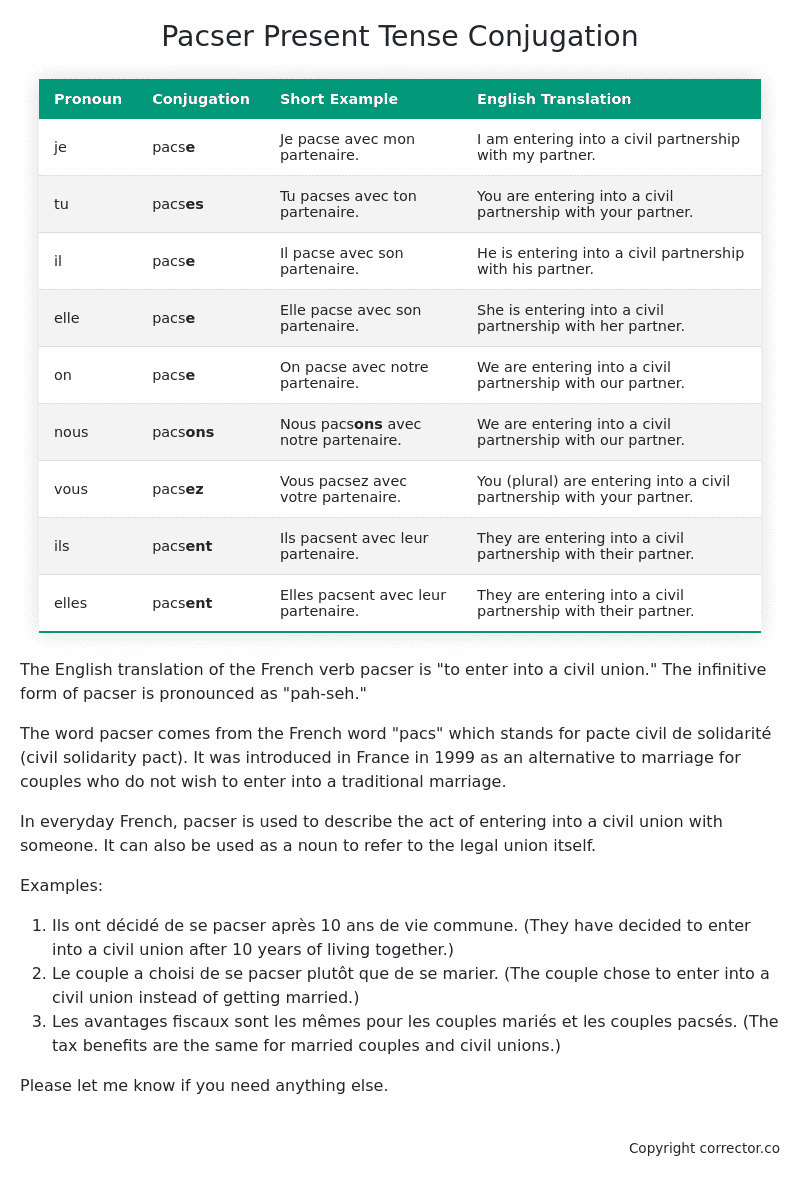Le Present (Present Tense) Conjugation of the French Verb pacser
Introduction to the verb pacser
The English translation of the French verb pacser is “to enter into a civil union.” The infinitive form of pacser is pronounced as “pah-seh.”
The word pacser comes from the French word “pacs” which stands for pacte civil de solidarité (civil solidarity pact). It was introduced in France in 1999 as an alternative to marriage for couples who do not wish to enter into a traditional marriage.
In everyday French, pacser is used to describe the act of entering into a civil union with someone. It can also be used as a noun to refer to the legal union itself.
Examples:
- Ils ont décidé de se pacser après 10 ans de vie commune. (They have decided to enter into a civil union after 10 years of living together.)
- Le couple a choisi de se pacser plutôt que de se marier. (The couple chose to enter into a civil union instead of getting married.)
- Les avantages fiscaux sont les mêmes pour les couples mariés et les couples pacsés. (The tax benefits are the same for married couples and civil unions.)
Please let me know if you need anything else.
Pacser – About the French Present Tense
To take a deep dive into all the French tenses then see our article on Mastering French Tense Conjugation.
Common Everyday Usage Patterns For Le Present
Interactions with Other Tenses
Table of the Present Tense Conjugation of pacser
| Pronoun | Conjugation | Short Example | English Translation |
|---|---|---|---|
| je | pacse | Je pacse avec mon partenaire. | I am entering into a civil partnership with my partner. |
| tu | pacses | Tu pacses avec ton partenaire. | You are entering into a civil partnership with your partner. |
| il | pacse | Il pacse avec son partenaire. | He is entering into a civil partnership with his partner. |
| elle | pacse | Elle pacse avec son partenaire. | She is entering into a civil partnership with her partner. |
| on | pacse | On pacse avec notre partenaire. | We are entering into a civil partnership with our partner. |
| nous | pacsons | Nous pacsons avec notre partenaire. | We are entering into a civil partnership with our partner. |
| vous | pacsez | Vous pacsez avec votre partenaire. | You (plural) are entering into a civil partnership with your partner. |
| ils | pacsent | Ils pacsent avec leur partenaire. | They are entering into a civil partnership with their partner. |
| elles | pacsent | Elles pacsent avec leur partenaire. | They are entering into a civil partnership with their partner. |
Other Conjugations for Pacser.
Le Present (Present Tense) Conjugation of the French Verb pacser (this article)
Imparfait (Imperfect) Tense Conjugation of the French Verb pacser
Passé Simple (Simple Past) Tense Conjugation of the French Verb pacser
Passé Composé (Present Perfect) Tense Conjugation of the French Verb pacser
Futur Simple (Simple Future) Tense Conjugation of the French Verb pacser
Futur Proche (Near Future) Tense Conjugation of the French Verb pacser
Plus-que-parfait (Pluperfect) Tense Conjugation of the French Verb pacser
Passé Antérieur (Past Anterior) Tense Conjugation of the French Verb pacser
Futur Antérieur (Future Anterior) Tense Conjugation of the French Verb pacser
Subjonctif Présent (Subjunctive Present) Tense Conjugation of the French Verb pacser
Subjonctif Passé (Subjunctive Past) Tense Conjugation of the French Verb pacser
Subjonctif Imparfait (Subjunctive Imperfect) Tense Conjugation of the French Verb pacser
Subjonctif Plus-que-parfait (Subjunctive Pluperfect) Tense Conjugation of the French Verb pacser
Conditionnel Présent (Conditional Present) Tense Conjugation of the French Verb pacser
Conditionnel Passé (Conditional Past) Tense Conjugation of the French Verb pacser
L’impératif Présent (Imperative Present) Tense Conjugation of the French Verb pacser
L’infinitif Présent (Infinitive Present) Tense Conjugation of the French Verb pacser
Struggling with French verbs or the language in general? Why not use our free French Grammar Checker – no registration required!
Get a FREE Download Study Sheet of this Conjugation 🔥
Simply right click the image below, click “save image” and get your free reference for the pacser Present Tense tense conjugation!

I hope you enjoyed this article on the verb pacser. Still in a learning mood? Check out another TOTALLY random French verb present conjugation!


